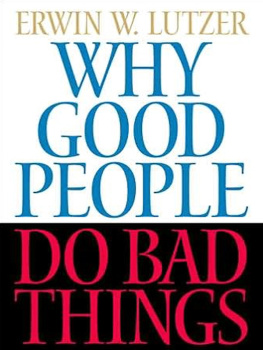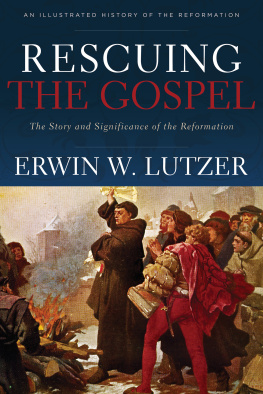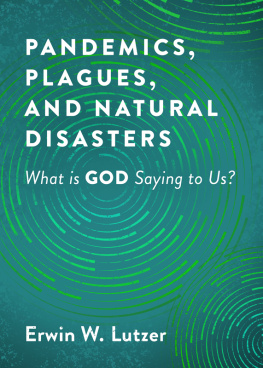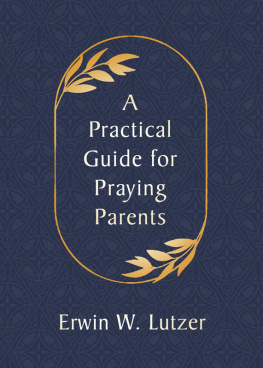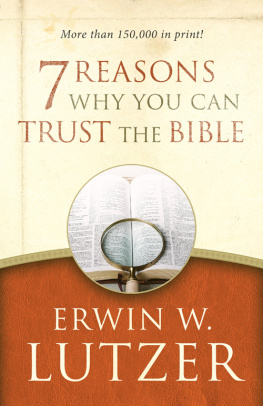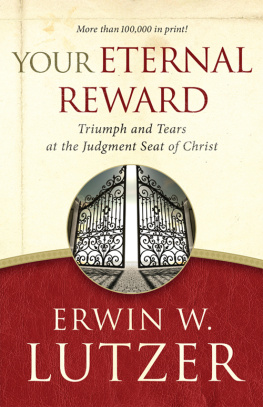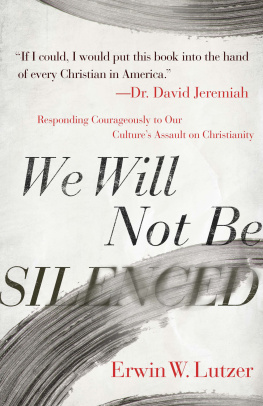Erwin Lutzer - Why Good People Do Bad Things
Here you can read online Erwin Lutzer - Why Good People Do Bad Things full text of the book (entire story) in english for free. Download pdf and epub, get meaning, cover and reviews about this ebook. year: 2001, publisher: Thomas Nelson, genre: Religion. Description of the work, (preface) as well as reviews are available. Best literature library LitArk.com created for fans of good reading and offers a wide selection of genres:
Romance novel
Science fiction
Adventure
Detective
Science
History
Home and family
Prose
Art
Politics
Computer
Non-fiction
Religion
Business
Children
Humor
Choose a favorite category and find really read worthwhile books. Enjoy immersion in the world of imagination, feel the emotions of the characters or learn something new for yourself, make an fascinating discovery.
- Book:Why Good People Do Bad Things
- Author:
- Publisher:Thomas Nelson
- Genre:
- Year:2001
- Rating:5 / 5
- Favourites:Add to favourites
- Your mark:
- 100
- 1
- 2
- 3
- 4
- 5
Why Good People Do Bad Things: summary, description and annotation
We offer to read an annotation, description, summary or preface (depends on what the author of the book "Why Good People Do Bad Things" wrote himself). If you haven't found the necessary information about the book — write in the comments, we will try to find it.
We are all deceived, driven by selfish desires, and incapable of doing what we know to be right in our own human strength. Premier Bible teacher Dr. Erwin Lutzer explains the hopeful reality that change is possible through the sometimes painful process of Godgiven revelation and honesty.
Why Good People Do Bad Things — read online for free the complete book (whole text) full work
Below is the text of the book, divided by pages. System saving the place of the last page read, allows you to conveniently read the book "Why Good People Do Bad Things" online for free, without having to search again every time where you left off. Put a bookmark, and you can go to the page where you finished reading at any time.
Font size:
Interval:
Bookmark:

WHY
GOOD PEOPLE
DO
BAD THINGS
WHY
GOOD PEOPLE
DO
BAD THINGS
ERWIN W. LUTZER

Copyright 2001 by Erwin W. Lutzer
Published by W Publishing Group, a Division of Thomas Nelson, Inc.,
P. O. Box 141000, Nashville, Tennessee 37214.
All rights reserved. No portion of this book may be reproduced, stored in a retrieval system, or transmitted in any form or by any means electronic, mechanical, photocopy, recording, or any otherexcept for brief quotations in printed reviews, without the prior permission of the publisher.
Unless otherwise noted, Scripture quotations are from the Holy Bible,New International Version. Copyright 1973, 1978, 1984 International Bible Society. Used by permission of Zondervan Bible Publishers.
Scriptures noted NASB are from the New American Standard Bible, copyright 1960, 1962, 1963, 1968, 1971, 1972, 1973, 1975, 1977 by The Lockman Foundation and are used by permission.
Scriptures noted KJV are from the King James Version of the Bible.
ISBN 0-8499-1667-4
Printed in the United States of America
03 04 05 06 07 PHX 9 8 7 6 5 4 3
CONTENTS
W HEN EVA BRAUNS HOME MOVIES of Adolf Hitler were discovered, some objected to them being released to the public. The critics argued that the movies humanized Hitler; they made him appear so normal within the context of everyday life. The objectors did not want people to see him smiling, playing with his dog, or tousling the hair of a four-year-old girl. They preferred that he be remembered as one mysteriously aloof from the common delights of other mortals; they wanted to retain the fiction of a nonhuman Hitler.
But the fact is, Hitler was humanperhaps too human. The seeds of his hatred and egomania did not reside in him alone but can be found in the lives of many who dominate the pages of history. Yes, the number of people who have committed crimes on a massive scale is relatively small. But history has proved that there are thousands of Hitlers, some more famous than others, others equally wicked but lacking the resources to carry out their diabolical plans. No, Hitler is not an aberration, for the blood of humanity ran through his veins. If you think that his ilk no longer exists on the face of the earth, just read todays newspaper!
Though we cringe at Hitlers crimes, many people have never seriously grappled with the fact that any one of us, given the right combination of desires and circumstances, is capable of evileven great evil, the kind that we are quick to condemn in others. We are both naive and dishonest if we do not take into account the obvious fact that even in so-called good people, the potential for evil on a grand scale lies dormant.
A MYSTERY
I think every person is a mystery, and its strange to me that a person I grew up with and was very close with remains one of the greatest mysteries of all. These are the words of the mild-mannered David Kaczynski when speaking of his brother, Ted, the so-called Unabomber, who was responsible for planting bombs on university campuses, killing several people. Yes, every person is a mystery, and it is this mystery we seek to probe in the following pages.
The mystery, of course, can be simply stated: Why is it that we as members of the human race, who have such great capacities for achievement in art, science, and compassionate sacrifice, have within us the seeds of greed, hatred, egomania, and destruction? Pascal speaks of our struggle: True religion must teach that there is in man some fundamental principle of his greatness, as well as some greatly rooted principle of his misery. Greatness and miserythat is our story, the story of the human race.
The matter is complicated because the line between greatness and miserybetween the good and the badis often blurred due to the fact that the same person is capable of both. For example, by any standard Picasso was a genius of staggering proportions. Yet, his private life was in shambles, and worse, he abused those around him with arrogant disdain. His first wife, Olga, went insane; his mistress Marie-Therese Walter hanged herself; a second mistress suffered a nervous breakdown; his second wife, Jacqueline, shot herself to death. Robert Rosenblum, who has made Picasso the object of detailed study, comments, This man, with irresistible charm, manipulative self-promotion and shocking cruelty, changed the life of every person he met.
Irresistible charm! Shocking cruelty! This dual aspect of man fosters his delusions. Though he can see the evil in others, he concentrates on the good when evaluating himself. Thus, as we shall see, some people are blind to their own faults and appear incapable of honest evaluation. They hide not only from God and others, but also from themselves.
I doubt that some children are born with a greater degree of original sin than others. That some have an obvious propensity to perversity as they grow older is clear enough, but we all know peoplegood peoplewho have done some very bad things. We all have been shocked by friends, churchgoers, and relatives from the finest of homes who have not lived up to our expectations. Shakespeare was right when he said, Good wombs hath borne bad sons. Reflect for a moment:
Weve known ministers, with a reputation for being kind and loving, who have abandoned their wives and children for another lover.
Weve known otherwise reputable people who have pilfered funds from bank accounts, doctored checkbooks, or stolen money outright.
Weve known those who in the interest of self-protection have destroyed those around them with lies, distortions, and cunning schemes.
Weve known people who have become addicted to power, sex, drugs, or alcohol.
We all have knownif we were totally honestthat we have had the potential of doing greater evil if we had not been restrained by the expectations of our friends, the laws of the land, and most important, the grace of God. As Solzhenitsyn said, the line between good and evil is not drawn through the human race, but through every human heart. There is a mixture of the good, the bad, and the ugly in us all. Seneca declared, Man gazes at the stars but his feet are in mud. Because we are capable of falling into the mud, Scripture reminds us, If you think you are standing firm, be careful that you dont fall! (1 Cor. 10:12).
We have to fear our own hearts. It would take only a few minutes for any one of us to destroy our reputation, ruin our marriage, and cause our friends to lose their respect for us. No wonder Luther said that he feared his own heart more than he did the pope!
THE HUMAN HEART
The purpose of this book is to shine a light on the human heart, to honestly admit to our own deceptions and sins. The more aware we are of our need, the more appreciative we will be for Gods gracious intervention to save us from ourselves. There is plenty of hope on these pages for the criminal, as well as for the self-respecting churchgoer who really cant think of anything he has done wrong in, say, the last five years. As we shall learn, the latter might need more help than the former!
Keep this in mind as you read.
First, this is not a textbook on psychology as such. The insights of psychology are helpful for analysis, but psychology cannot prescribe a cure for what ails us. My contention is that with few exceptions, psychology has not taken evil as seriously as it should. And even those who have plumbed the depths of human nature have not found the key to the transformation of the human heart. God, who entered our world through Christ, is the only One who can forgive us, change our desires, and fill our aching void. We must not believe the lie that we are incapable of change.
Next pageFont size:
Interval:
Bookmark:
Similar books «Why Good People Do Bad Things»
Look at similar books to Why Good People Do Bad Things. We have selected literature similar in name and meaning in the hope of providing readers with more options to find new, interesting, not yet read works.
Discussion, reviews of the book Why Good People Do Bad Things and just readers' own opinions. Leave your comments, write what you think about the work, its meaning or the main characters. Specify what exactly you liked and what you didn't like, and why you think so.

